|
|
|
Sort Order |
|
|
|
Items / Page
|
|
|
|
|
|
|
| Srl | Item |
| 1 |
ID:
179508


|
|
|
|
|
| Summary/Abstract |
This paper explores how Fourth Industrial Revolution (4IR) technologies obscure the traditional boundaries associated with the military realm. As the first examination of the conditions underlying the assimilation of 4IR technologies in Israel’s armed forces, this paper makes several contributions. It expands the knowledge on the military assimilation of 4IR technologies and describes the interaction between military doctrine and technology using current evidence. It also enriches the evolving discussion on the strategic effect of emerging technologies. Finally, it demonstrates how emerging technologies involve neither straightforward spinoff or spin-on processes but a reciprocal transfer of know-how between the military and civilian sectors.
|
|
|
|
|
|
|
|
|
|
|
|
|
|
|
|
| 2 |
ID:
124772
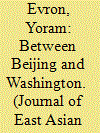

|
|
|
|
|
| Publication |
2013.
|
| Summary/Abstract |
Technological ties between Israel and China have always been a central and constant element of their relationship. Defense contracts played a leading role here but were also responsible for the severe crisis that erupted between the countries in the early 2000s after Israel, capitulating to US pressure, backed off from its commitment to provide China with military technologies. This not only forced Israel to sever its defense relations with China but also made US-Israel relations a principal factor in the Sino-Israeli connection and imposed tight constraints on Israel's technology transfers to China generally. For Israel, this placed the dilemma of commercial versus political and national security interests at the forefront, since technology connections allowed it to promote its economic, political, and strategic causes through China. Indeed, while technology ties between the states have not stopped entirely-they have shifted to the civilian sphere-technology transfers to China are subject to heavy limitations, and Israel's export control mechanism faces greater challenges to screen them. As China's economic and political influence is ever increasing, Israel's cautious approach to technology transfers to China may be expected to come under mounting pressure.
|
|
|
|
|
|
|
|
|
|
|
|
|
|
|
|
| 3 |
ID:
164418
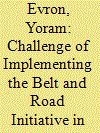

|
|
|
|
|
| Summary/Abstract |
Sceptics query China's economic and political ability to realize its Belt and Road Initiative (BRI). Less attention has been paid to BRI's implications for one of the defining features of China's foreign policy: low engagement in areas beyond its traditional sphere of influence. The Middle East is such a case. Addressing this issue, the article explores the mutual impact of China's low political involvement in the Middle East and BRI's realization. Distinguishing cross-border connectivity projects from other BRI-associated activities, the article examines the challenges to executing BRI-related projects in Israel. It finds that realizing connectivity projects – the essence of the BRI vision – will require China to increase its regional engagement, a shift that it has so far avoided.
|
|
|
|
|
|
|
|
|
|
|
|
|
|
|
|
| 4 |
ID:
153642
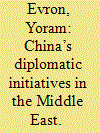

|
|
|
|
|
| Summary/Abstract |
Since the early 2010s, there have been mounting calls in China to intensify its role in the Middle East. But seeing the region as highly turbulent, Beijing seems to restrain its political involvement there. So what role does China actually strive for in the Middle East? To answer this question, the article first presents China’s discourse on its future role in the region; next, it analyzes China’s involvement in the Israeli–Palestinian conflict and the Syrian civil war, focusing on three diplomatic initiatives it has made concerning these issues. The argument here is that China strives to be part of major processes in the Middle East and attempts to advance its values and interests there, but in a unique pattern of big-power involvement in the region, it tries to achieve this without intensive investment of political, economic, and military resources.
|
|
|
|
|
|
|
|
|
|
|
|
|
|
|
|
| 5 |
ID:
151444
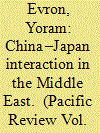

|
|
|
|
|
| Summary/Abstract |
As most studies on Middle East–East Asian relations focus on the interregional dimension, the manner in which relations between East Asian powers influence, and are influenced by, their policies in the Middle East are largely overlooked. Attempting to add another layer to the study of Sino-Japanese relations, this article explores whether Sino-Japanese rivalry extends to the Middle East. This undertaking requires a conceptual distinction between measures related to Sino-Japanese competition in the Middle East and measures which are related to their rivalry. Building on a minimal definition of interstate rivalry, the article argues that neither the effort to secure energy supply nor their economic or political competition there is shaped by their rivalry. The only field that can be associated with that rivalry is Japan's quasi-military activity in the Middle East, which may enhance its security policy's revision. That, in turn, causes much concern and criticism in Beijing, thus assigning the region a certain role in their relations.
|
|
|
|
|
|
|
|
|
|
|
|
|
|
|
|
| 6 |
ID:
111151
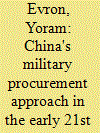

|
|
|
|
|
| Publication |
2012.
|
| Summary/Abstract |
This article attempts to lay out a conceptual framework for evaluating the actual military value of China's newly developed weaponry. Its basic assumption is that technological military progress is not sufficient to increase military strength. Therefore an alternative approach is adopted that studies the adaptability of the new technologies to the country's strategic situation. To this end, the study assumes that the value of a weapon system is measured by its suitability to the country's military, economic and technological conditions. The country's ability to meet these requirements depends to a large extent on the procurement process. Exploring China's recent military procurement approach, the study finds that under the prevailing conditions, China's military procurement process could reduce the actual military value of the newly developed weaponry.
|
|
|
|
|
|
|
|
|
|
|
|
|
|
|
|
| 7 |
ID:
177576
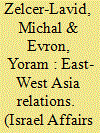

|
|
|
|
|
| Summary/Abstract |
As East-West Asia relations expand and diversify, cross-regional non-state relations develop as well. Surprisingly though, this development has so far been largely overlooked. Attempting to fill this void, this article focuses on the involvement of Japan’s and South Korea’s civil societies in the Israeli-Palestinian conflict. More specifically, it argues that the intensification of cross-regional connections between East Asia and the Middle East generates involvement of the civil society in this conflict, whose specific shape is influenced by the attributes of each state. To test this supposition, the article comparatively examines the civilian protests in Japan and South Korea against Israel and their impact. The article’s contribution is fourfold: it examines the important yet inadequately studied growing civil society participation in East-West Asia relations; it indicates the relatively new interaction between state and non-state actors in East Asia concerning the Middle East; it explores for the first time protest movements against Israel in East Asia; and it enriches existing knowledge about civil society participation in South Korea’s and Japan’s foreign relations with an intriguing yet so far overlooked case.
|
|
|
|
|
|
|
|
|
|
|
|
|
|
|
|
| 8 |
ID:
154497
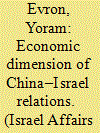

|
|
|
|
|
| Summary/Abstract |
Exploring Sino-Israeli economic relations comprehensively for the first time, this article suggests that this connection allowed the two states to overcome the defence crises that the relationship experienced in the early 2000s. After 2010, as China resolved to enhance relations with Israel, economic ties continued to fulfil a prominent role. Nevertheless, achievements have been mixed. Apparently, investments of Chinese firms in Israel and construction of infrastructure projects in Israel by Chinese corporations are the most successful activities, but they arouse mixed responses in Israel and may have political implications yet to be clarified.
|
|
|
|
|
|
|
|
|
|
|
|
|
|
|
|
| 9 |
ID:
169118
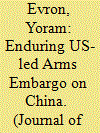

|
|
|
|
|
| Summary/Abstract |
Since the end of the Cold War, arms embargoes have typically been imposed on isolated and relatively weak states. Exceptionally, the 1989 US-led arms embargo on China is imposed on an influential world power that has various means to deal with it. Moreover, it has so far failed to change the behavior of and reduce arms imports by the targeted state—two basic parameters of arms embargo success. Attempting to explain the endurance of China arms embargo and building on the vast literature of international sanctions, the article closely examines the embargo’s changing goals, costs, and implementation over the years. Arguing that the evolvement of these three components has kept the embargo cost-effective, the article enhances our understanding of the effectiveness of US China policy and concurrently illustrates the capacity of international sanctions to expose the true goal hierarchy, means, and political processes that underlie foreign policies.
|
|
|
|
|
|
|
|
|
|
|
|
|
|
|
|
| 10 |
ID:
160483
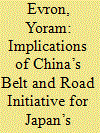

|
|
|
|
|
| Summary/Abstract |
In recent years, the ties between Asian powers and Middle Eastern countries have grown significantly, and the consequence of this development is a gradual spin-off of intra-Asian political process to the Middle East. China’s Belt and Road Initiative (BRI) provides an intriguing illustration of such a possible spin-off. Japan’s response to BRI is mostly negative but less clear is the possible implications of the China–Japan confrontation over BRI for their interaction with the Middle East. Japan’s responses to the BRI and China’s perceptions thereof can expand the set of factors that shape the two Asian powers’ involvement in that region.
|
|
|
|
|
|
|
|
|
|
|
|
|
|
|
|
| 11 |
ID:
144756


|
|
|
|
|
| Summary/Abstract |
Israel’s China policy has traditionally been influenced by Washington’s explicit and perceived pressure. In the early 2010s, Israel started to explore a more independent path in regard to China. In view of global developments, such a change seemed reasonable. However, prevailing conditions prevent Israel from developing an independent China policy.
|
|
|
|
|
|
|
|
|
|
|
|
|
|
|
|
|
|
|
|
|